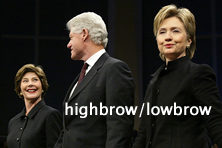 How much can a poor nation take?
How much can a poor nation take?
Apparently, a lot.
Out of all of the amazingly awful government activities that have occurred since my last post (Ms. Goodling? Frodo? Democratic Iraq War Funding Back Down?) the most definite worst is the quiet announcement, via a smiling Tony Snow, that President Bush considers South Korea
as a model for future American troop presence in Iraq.
If you needed further evidence that the President doesn't get "it" when it comes to battling international terrorism this revelation is your murder weapon. Like wild-eyed Phil Spector walking up to his Driver saying, "I think I just killed someone," President Bush seems comfortable facing the nation saying, "I think I just created more terrorists."
Remember my post about Ron Paul and how he dared to speak the plain truth--that American actions in the Middle East help to irritate latent terrorist sensitivities? Well, this South Korea talk is sort of like turning up the radio after a neighbor complains.
I'm not suggesting that fundamentalist terrorists should ultimately dictate our actions, or that their sick desire for American deaths equals a complaint, but what I would like to suggest is that our President's inability to admit that our behaviors in the Middle East region directly influence terrorist intensity--and motivation--deeply harms our national defense. Bring it on, indeed.
If the purpose of our going into Iraq was to bring democracy to the Iraqi people--what Frank Rich calls our "last-ditch rationalization"--then how can a long-term American military presence in Iraq foster anything but paternalism and lazy liberty?
The American military must leave Iraq and see what happens. Hasn't "Let's see what happens" been our military mantra for 4 years? To surge the numbers of our young men and women into Iraq under a "fight them there, not here" slogan is to allow Americans to die simply to prevent a different version of the chaos that is now in Iraq. That isn't national defense, it's nationally offensive. President Bush should put down his Teddy Roosevelt books and read some more recent history (and not Reagan bunk). Like Richard Nixon and his pathetic refusal to admit Vietnamization was a failure, the height of tragic superpower ignorance has been watching Bush deny that a civil war is the main source of violence meeting our troops each day. If the American "global war on terrorism" policy is as firm and tough as the Bush Administration claims, the terrorists would not follow us here because they would not be able to: we are supposedly on the offense around the globe.
But Bush doesn't care much about "the globe" and he never has--his war on terror is based in Iraq because Bush applies outdated foreign policy to the 9/11 world--fight within a messy nation, not a messy network of terror cells. He explicitly lives in the New World Order of his father's time, and not the one he has helped create. When it comes to foreign policy, W. is all pomp and no circumstances, and his isolationist approach to world diplomacy for the past 7 years has seriously eroded our nation's moral and practical powers. The assault has been on not only reason, but history.
Oh... but what of the Iraqi people? We liberated them into a civil war? Do we owe them anything?
Not according to our President, who has slowly begun to blame Iraq for being unable to heal a wound the U.S. quickly inflicted. Ask not what your country can do for you, ask how you would feel if America took over your country in order to fight terrorism somewhere expendable. We're fighting them "there," without regard to how the choice of the "there" creates more hatred of our existence. If you build those South-Korea-lite bases, Mr. President, you will have truly helped manufacture a permanent terrorist factory. What a shitty legacy.
Also: Check out Fred Kaplan at
Slate for
his more serious take on how ridiculous the Korea-Iraq analogy is in historical terms.
 Over the weekend in San Francisco, Elizabeth Edwards revealed that she is "comfortable" with gay marriage. The San Francisco Chronicle reported this position was "markedly" different than her husband's position, which is in support of civil unions, but not marriage. Question: how does such a distinction qualify as "marked"? (Which means "strikingly noticeable".)
Over the weekend in San Francisco, Elizabeth Edwards revealed that she is "comfortable" with gay marriage. The San Francisco Chronicle reported this position was "markedly" different than her husband's position, which is in support of civil unions, but not marriage. Question: how does such a distinction qualify as "marked"? (Which means "strikingly noticeable".)








 How much can a poor nation take?
How much can a poor nation take? 



